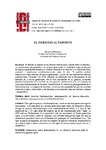Mostrar o rexistro simple do ítem
El derecho al deporte
| dc.contributor.author | Maniatis, Antonio | |
| dc.date.accessioned | 2019-02-15T12:26:30Z | |
| dc.date.available | 2019-02-15T12:26:30Z | |
| dc.date.issued | 2017 | |
| dc.identifier.citation | Anuario da Facultade de Dereito da Universidade da Coruña, 2017, 21: 178-191. ISSN: 1138-039X | es_ES |
| dc.identifier.issn | 1138-039X | |
| dc.identifier.uri | http://hdl.handle.net/2183/21800 | |
| dc.description.abstract | [Resumen]: El derecho al deporte es un derecho fundamental, basado sobre el derecho a las asociaciones que pertenece a la primera generación. Se considera como un derecho de segunda generación mientras su versión alternativa de derecho a la educación física comenzó a positivarse constitucionalmente antes de éste. Es posible también considerarse como derecho de tercera generación, a partir del uso explícito del término constitucional ‘’derecho’’ en 1976. Además, es conectado con el movimiento de los derechos de la cuarta generación. No se trata meramente de un genuino, autónomo derecho fundamental sino también de una garantía institucional y de un conjunto de principios fundamentales de Derecho Constitucional. El derecho al perseguimiento de la felicidad incluye la categoría de derechos a la recreación, ejemplificada por los derechos culturales (cultura, educación) y los derechos al movimiento humano (deporte, turismo –hospitalidad). | es_ES |
| dc.description.abstract | [Abstract] The right to sport is a fundamental one, based on the first generation right to associations. It is considered as a second generation right whilst its alternative version of right to physical education began to be constitutionalized before it. It may be also considered as a 3G right, from the explicit use of the constitutional term ‘’right’’ in 1976 and on. Furthermore, it is connected with the movement of fourth generation rights. It is not merely about an authentic, self-existent fundamental right but also an institutional guarantee and a set of fundamental principles of Constitutional Law. The right to pursuit of happiness includes the category of rights to recreation, exemplified by the cultural rights (culture, education) and the rights to human motion (sport, tourism – hospitality). | es_ES |
| dc.language.iso | spa | es_ES |
| dc.rights | Atribución-NoComercial 3.0 España | es_ES |
| dc.rights.uri | http://creativecommons.org/licenses/by-sa/3.0/es/ | * |
| dc.subject | Derechos fundamentales | es_ES |
| dc.subject | Heterogeneidad del derecho | es_ES |
| dc.subject | Educación física | es_ES |
| dc.subject | Derecho al perseguimiento de la felicidad | es_ES |
| dc.subject | Deporte | es_ES |
| dc.subject | Fundamental rights | es_ES |
| dc.subject | Heterogeneity of law | es_ES |
| dc.subject | Physical education | es_ES |
| dc.subject | Right topursuit of happiness | es_ES |
| dc.subject | Sport | es_ES |
| dc.title | El derecho al deporte | es_ES |
| dc.type | info:eu-repo/semantics/article | es_ES |
| dc.rights.access | info:eu-repo/semantics/openAccess | es_ES |
| UDC.journalTitle | Anuario da Facultade de Dereito da Universidade da Coruña | es_ES |
| UDC.volume | 21 | es_ES |
| UDC.startPage | 178 | es_ES |
| UDC.endPage | 191 | es_ES |
| dc.identifier.doi | https://doi.org/10.17979/afdudc.2017.21.0.3277 |






